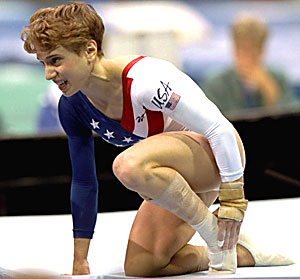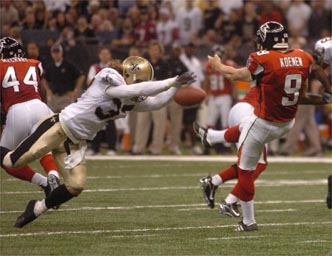I'm going to take a slightly different tack than my fellow bloggers and talk about 4 characteristics of sports that make them great, and then why I love sports.
1. Immediate, objective scoring - It is extremely hard for me to like or follow consistently any sport where the scoring system is subjective. Gymnastics, figure skating, ballroom dancing (on ESPN recently), etc. are examples of the failure of subjective scoring. Objectivity is critical because there's nothing objective about everyday life. Once you're out of school, you never get papers back with a grade at the top. When you go to an interview, you're not judged just on your tangible qualifications, but the interviewer's impression of you is paramount. Then you have to stew afterward until you get an offer (or not). In sports, when you finish, you know whether you won or lost by looking at the scoreboard. The immediacy and finality of it is beautiful in a way that our professional life can't provide. This quick resolution is a beautiful counterpoint to the stresses of modern life, including mortgages, careers, dating/marriage, etc. This is also different from sitcoms or dramas on TV that have an ongoing storyline. When the sporting event ends, it's over and you never have to revisit it if you don't want to. Further, the team that won did so legitimately (barring cheating or bad officiating). No back-room, good-old-boy network decides a game as long as it's scored objectively.
2. Commonality/Availability - The truth of the matter is that the TV stations have a lot to do with the sports you are really a fan of. For example, it's hard to be an F1 fan in this country. Very few parents watch it, and you have to get up at all hours on Sunday mornings to watch the race, assuming you even get Speed. On the other hand, NASCAR is on in primetime on a major network. Similar arguments go for cricket, soccer, CFL, lacrosse, and others. It's not that I don't like the sport or that I won't watch when it's available, but it's not on enough for me to know the rules well or have any familiarity with the players or teams. Further, one of the best advantages of being a sports fan is being able to discuss it with your buddies (or post blog articles about it). It's frustrating if no one else knows what you're talking about or if no one else cares. This argument also applies to sports like college baseball. The level of play is quite high, but prior to ESPN's coverage of the Super Regionals, almost no casual fan had any idea who the best teams in the country were. Consistent availability is key to building a fan base. You know your local NFL team will be on every Sunday from September through December (or Monday night).
3. Energizing a city - Others have talked about this as well, so I'll make this short. Sports have the ability to remove an entire populace from the toil and problems of their lives, and unite them in joy, even though the victory has no effect on them materially. It can give them the strength to keep going and an example to follow. J-Red's comments about Detroit and hockey this year were very much along the same lines. I would add the Saints' incredible season the year after Katrina. Their victory in the Superdome against the Falcons in the first game back will never be forgotten in New Orleans because it meant so much to the city.
I'm a sports fan because sports are what you make of them. When I'm exhausted and just need to zone out, I can watch a game and know what's going on without paying careful attention. When I want inspiration, I can watch an underdog like Namath's Jets (or the Netherlands yesterday in Euro 2008 vs. Italy) create a victory where it seemed unlikely or impossible. When I want to think about being the best that I can be, there's Tiger Woods or Roger Federer (except at the French Open), winning at will with a focus and determination that would be successful anywhere. Belichick's Patriots and TO with the Eagles provide valuable instruction on teamwork, or the lack thereof. Cal Ripken, Jr. provides an education in character, reliability and class. These lessons are all there for the taking, but can just as easily be ignored. And at times most importantly, it allows an engineer to communicate with other people he doesn't know well and has little in common with, preventing embarassment or awkwardness.
2. Commonality/Availability - The truth of the matter is that the TV stations have a lot to do with the sports you are really a fan of. For example, it's hard to be an F1 fan in this country. Very few parents watch it, and you have to get up at all hours on Sunday mornings to watch the race, assuming you even get Speed. On the other hand, NASCAR is on in primetime on a major network. Similar arguments go for cricket, soccer, CFL, lacrosse, and others. It's not that I don't like the sport or that I won't watch when it's available, but it's not on enough for me to know the rules well or have any familiarity with the players or teams. Further, one of the best advantages of being a sports fan is being able to discuss it with your buddies (or post blog articles about it). It's frustrating if no one else knows what you're talking about or if no one else cares. This argument also applies to sports like college baseball. The level of play is quite high, but prior to ESPN's coverage of the Super Regionals, almost no casual fan had any idea who the best teams in the country were. Consistent availability is key to building a fan base. You know your local NFL team will be on every Sunday from September through December (or Monday night).
3. Energizing a city - Others have talked about this as well, so I'll make this short. Sports have the ability to remove an entire populace from the toil and problems of their lives, and unite them in joy, even though the victory has no effect on them materially. It can give them the strength to keep going and an example to follow. J-Red's comments about Detroit and hockey this year were very much along the same lines. I would add the Saints' incredible season the year after Katrina. Their victory in the Superdome against the Falcons in the first game back will never be forgotten in New Orleans because it meant so much to the city.
The Intimidator was the ultimate "Evil" sports figure and he was loved for it. How many fans get to push people around like that?
4. Good vs. Evil - Sports figures are always cast as good and evil because it polarizes the support or opposition. This makes for a great story in the same way that cops vs. robbers, cowboys vs. indians, etc. have entertained countless generations of children. A David vs. Goliath story is compelling regardless of which side you're on. Goliath represents the making of history, "the best there ever was", and is your window onto greatness, a greatness that doesn't frequently appear at the average workplace nor is it acknowledged even if it is there. David represents the common man, the hope that you can one day be great at something also. Stories like "Cinderella Man" or "Rocky" or "Invincible" say to every member of the audience: "You too can be great, you just have to work hard and be ready for your opportunity when it comes." For most of us, it won't be in sports, but this attitude toward life is a good one. The truth of the matter is that sports dynasties like the Cowboys or the Patriots or Dale Earnhardt or USC aren't evil in the real sense of the word, but casting them as such makes the game that much more intense and exciting. And what better way to have good arguments than a polarizing figure?I'm a sports fan because sports are what you make of them. When I'm exhausted and just need to zone out, I can watch a game and know what's going on without paying careful attention. When I want inspiration, I can watch an underdog like Namath's Jets (or the Netherlands yesterday in Euro 2008 vs. Italy) create a victory where it seemed unlikely or impossible. When I want to think about being the best that I can be, there's Tiger Woods or Roger Federer (except at the French Open), winning at will with a focus and determination that would be successful anywhere. Belichick's Patriots and TO with the Eagles provide valuable instruction on teamwork, or the lack thereof. Cal Ripken, Jr. provides an education in character, reliability and class. These lessons are all there for the taking, but can just as easily be ignored. And at times most importantly, it allows an engineer to communicate with other people he doesn't know well and has little in common with, preventing embarassment or awkwardness.


2 Responses:
These are all great observations. Now that the four of us have had our say, we need to forward the collection to all the women in our lives who have ever said things like "you really only need to see the last few minutes, right?", "didn't these teams play each other already?", and "I don't see how 'What Not to Wear' is any different from your football games."
Who would claim that "What Not to Wear" isn't different from a football game?
Post a Comment